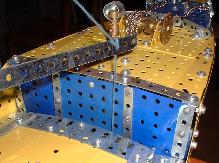 Building the decks
Building the decks
I modified almost the whole front deck, and slightly the rear deck.
This allowed me to get the 192 plates back for the
hatch covers.
 The front deck is arranged as shown in the opposite figure.
Triangular flexible plates of 3x5 holes (221)
extend the original deck, whereas the back of the deck is made of
two flat plates of 6x11 holes (52a).
Empty spaces between those plates and the hull are filled with a
triangular plate of 5 holes (76), a
triangular flexible plate of 5x5 holes (223)
and a flexible gusset plate (201). Those plates
are connected under the hull by a strip of 5 holes
(5) and a slotted strip of 5cm
(55a), as shown on the opposite figure.
The front deck is arranged as shown in the opposite figure.
Triangular flexible plates of 3x5 holes (221)
extend the original deck, whereas the back of the deck is made of
two flat plates of 6x11 holes (52a).
Empty spaces between those plates and the hull are filled with a
triangular plate of 5 holes (76), a
triangular flexible plate of 5x5 holes (223)
and a flexible gusset plate (201). Those plates
are connected under the hull by a strip of 5 holes
(5) and a slotted strip of 5cm
(55a), as shown on the opposite figure.
Three special strips of 5 holes (6) are fixed to the flat plate 52a by angle brackets, and arranged as shown in the opposite picture (apparently, the original model folded a strip of 11 holes following the same angles (!!))
The strip forming the very back of the deck is made of a strip of 11 holes (2) and a strip of 7 holes (3) which overlap on 2 holes. This strip is fixed to the flat plate 52a by two triangular plates of 2 holes (77), as shown by detail A on the pictures.
 Finally, an angle bracket of 1x2 holes (12b)
links the flat plate 52a and a
flanged plate of 7x5 holes (53) vertically fixed;
this flanged plate is also fixed, at the bottom, by two angle brackets
to a strip. On each side of the flanged plate are fixed 2
plastic plates of 3x5 holes (194), and some
narrow strips of 5 holes (235) are connected to
the plates 194 and to the flanged plate
53. At last, the plates
194 are connected by angle brackets to double
angle strips of 5 holes (48) which are fixed
to the hull.
Finally, an angle bracket of 1x2 holes (12b)
links the flat plate 52a and a
flanged plate of 7x5 holes (53) vertically fixed;
this flanged plate is also fixed, at the bottom, by two angle brackets
to a strip. On each side of the flanged plate are fixed 2
plastic plates of 3x5 holes (194), and some
narrow strips of 5 holes (235) are connected to
the plates 194 and to the flanged plate
53. At last, the plates
194 are connected by angle brackets to double
angle strips of 5 holes (48) which are fixed
to the hull.
 The rear deck is constructed as told in the Meccano manual; the only
modification concerns the plates 191, replaced
by plastic plates of 9x5 holes (194c), giving
a uniform color to the deck. Moreover, the curved strips of 5 holes
(90) overlap each other on 4 holes,
and each one overlaps a curved strip of 11 holes
(89) on 1 hole.
Finally, the circular plate of 10cm (146a)
is connected to the hull by an angle bracket 1x2 holes
(12b).
The rear deck is constructed as told in the Meccano manual; the only
modification concerns the plates 191, replaced
by plastic plates of 9x5 holes (194c), giving
a uniform color to the deck. Moreover, the curved strips of 5 holes
(90) overlap each other on 4 holes,
and each one overlaps a curved strip of 11 holes
(89) on 1 hole.
Finally, the circular plate of 10cm (146a)
is connected to the hull by an angle bracket 1x2 holes
(12b).

 The front of the rear deck is presented on the opposite figure.
The lower strip is made of a strip of 15 holes (1b)
fixed on two strips of 5 holes (5) -- the
overlap is of 2 holes; those two strips n.5 are
fixed on double brackets of 2 holes (11a),
themselves fixed on an angle girder of 23 holes (an
angle girder of 11 holes (9) and an
angle girder of 9 holes (9a) overlapping on
1 hole). Finally, a fishplate (10) allows to
fill the empty space between the lower strip and the hull; as the latter
is a little skewed, the fishplate has to be fixed at its oval hole
and adjusted as needed.
The front of the rear deck is presented on the opposite figure.
The lower strip is made of a strip of 15 holes (1b)
fixed on two strips of 5 holes (5) -- the
overlap is of 2 holes; those two strips n.5 are
fixed on double brackets of 2 holes (11a),
themselves fixed on an angle girder of 23 holes (an
angle girder of 11 holes (9) and an
angle girder of 9 holes (9a) overlapping on
1 hole). Finally, a fishplate (10) allows to
fill the empty space between the lower strip and the hull; as the latter
is a little skewed, the fishplate has to be fixed at its oval hole
and adjusted as needed.



